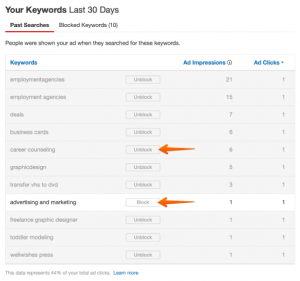
Have you heard that you can toss keyphrase research out the window and “write naturally” for Google?
Here’s the problem.
Following this advice means you’ll lose out on valuable traffic. Here’s why.
First, a little history…
Once upon a time, keyphrase stuffing was all the rage — and it worked. If you wanted to position for the phrase [blue widgets,] you’d repeat the keyphrase as many times as you could.
People didn’t worry as much about readability or the user experience. Everything was done in an attempt to send Google the signal, “Hey, this page is about blue widgets. We mentioned the phrase 100 times. Isn’t that worth a top-10 position?”
Many times, it would work (cringe). Sure, the page may not have converted. But position? Heck yeah.
Ever since Hummingbird (Google’s brand new algorithm), went live in 2013, people started screaming that keyphrases were dead. Keyphrase research was dead. After all, if you “write naturally,” Google will figure out what your page is about.
But that’s not quite accurate. Even if Hummingbird was Google’s first step into semantic search, it was a baby step. We’re getting closer — but we’re not there yet.
As Kristine Schachinger says in her great Search Engine Land post, “…and anyone who uses Google knows the dream of semantic search has not been realized. It’s not that Google meets none of the criteria, but Google falls far short of the full definition.”
The algorithm has changed, but the process stays the same
So, what does this mean to you?
It means that you still need to conduct keyphrase research before writing (and definitely before creating your content marketing strategy.) It’s still important. It’s still crucial.
And, if nothing else, it’s a good double-check to confirm you’re using words your readers actually type into Google.
That doesn’t mean that concept-based writing should be thrown out the window. It just means you need to balance it with some old-fashioned keyphrase research.
How do I know?
Because every month or so, I fly out to train a company in SEO content development. I highlight posts that have been “written naturally,” and I challenge the in-house writers to research and add keyphrases into the content.
You know what? Suddenly, posts that weren’t positioning before start positioning. Sometimes, they shoot to the top-10 with just a little bit of keyphrase editing.
Is it magic? Nope. It’s good ol’ back-to-basics SEO content writing.
How does this change how you write?
If you’re an in-house writer, and the mantra is “we don’t worry about keyphrase research,” a paradigm shift needs to happen before things change. Typically, this shift happens around redesign time — or after a content audit. The powers-that-be say, “Hey, we used to position, and we don’t anymore. What gives?”
That’s your cue to send them this post and remind your bosses that keyphrase research is required. That’s going to involve a process change. And it will often require going back to “tweak” old content. But it’s short-term pain for some major long-term gains.
If you’re new to keyphrase research, now is the time to learn the ins and outs. Know that there’s a learning curve. There are some complexities.
However, knowing how to research keyphrases is a powerful skill set. Once it “clicks” with you, you’ll be unstoppable.
Bottom-line: Keyphrase research is still important. “Writing naturally” is not a long-term, sustainable solution. And, if you’re not researching keyphrases already, it’s time to start.
Is your writing team stymied by keyphrase research? What are your experiences with “writing naturally?”
Digital & Social Articles on Business 2 Community(64)
Report Post






